Mises, Ludwig von. Human Action: A Treatise on Economics
Подождите немного. Документ загружается.

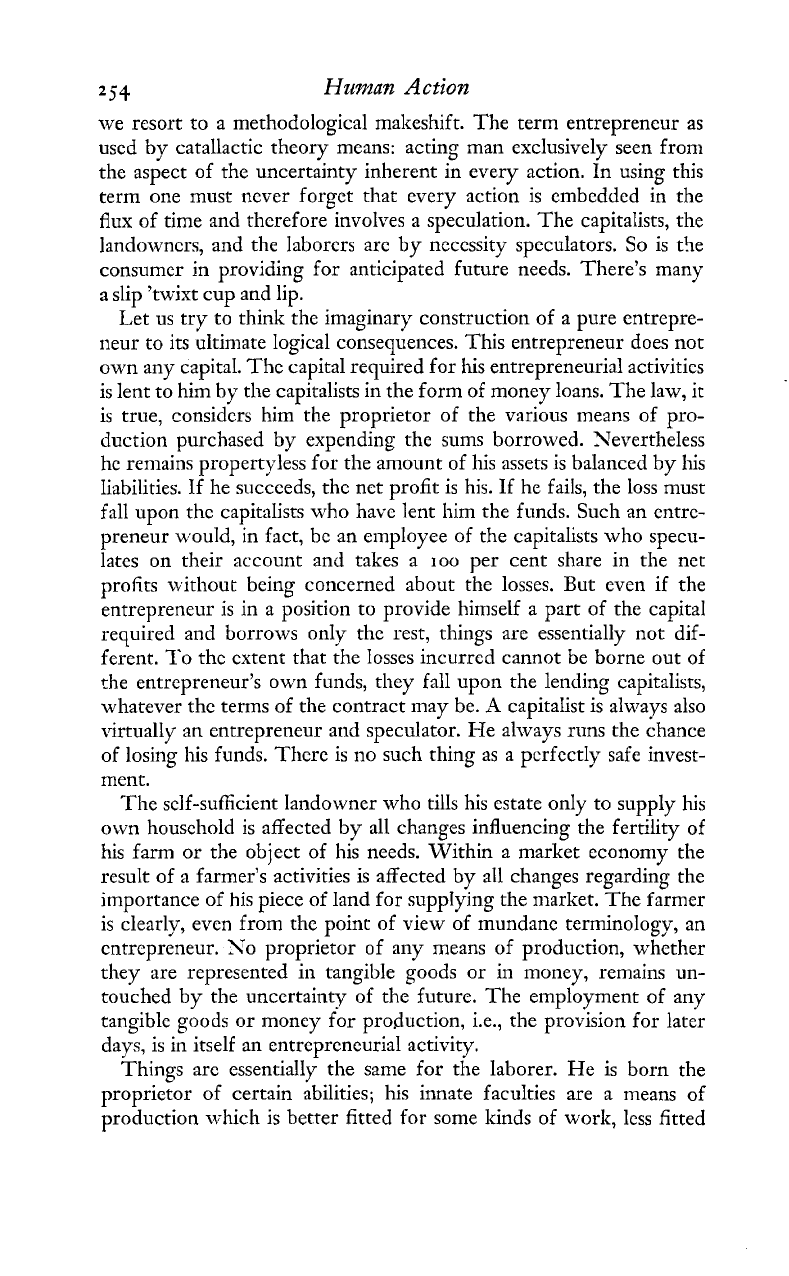
254
Human
Action
we resort to a methodological makeshift. The term entrepreneur as
uscd by catallactic theory means: acting man exclusively seen from
the aspect of the uncertainty inherent in every action. In using this
term one must ncver forget that every action is embedded in the
flux of time and therefore involves a speculation. The capitalists, the
landowners, and the laborers are
by
necessity speculators. So is the
consumer in providing for anticipated future needs. There's many
a slip 'twixt
CUP
and lip.
Let us try to think thc imaginary construction of a pure entrepre-
neur to its ultimate logical consequences. This entrepreneur does not
own any capital. The capital required for his entrepreneurial activities
is lent to him by the capitalists in the form of moncy loans. The law, it
is true, considers him the proprietor of the various means of pro-
duction purchased by
expending
the sums borrowed. LTevertheless
he remains propertyless for the amount of his assets is balanced by his
liabilities. If he succeeds, the net profit is his. If he fails, the loss must
fall upon thc capitalists who haw lent him the funds. Such an entrc-
preneur u odd, in fact, be an cmployee of the capitalists who specu-
lates on their account and takes a loo per cent share in the net
profits without being concerned about the losses. But even if the
entrepreneur is in a position to provide himself a part of the capital
required and borrows only the rest, things are essentially not dif-
ferent. To the extent that the Iosses incurred cannot be borne out of
rhe entrepreneur's own funds, they fall upon the lending capitalists,
whatever the terms of the contract may be.
A
capitalist is always also
virtually an entrepreneur and speculator. Ne always runs the chance
of losing his funds. Thcre is no such thing as a pcrfectly safe invest-
ment.
The self-sufficient landowner who tills his estate only to supply his
own household is affected by all changes influencing the fertility of
his farm or the object of his needs. Within
a
market economy the
result of a farmer's activities is affected by all changes regarding the
importance of his piece of iand for suppiying the market. The farmer
is clearly, even from the point of view of mundane terminology, an
entrepreneur. So proprietor of any means of production, whether
they are represented in tangible goods or in money, remains un-
touched by the unccrtainty of the future. The employment of any
tangible goods or money for production, i.e., the provision for later
days, is in itself an entreprcncurial activity.
Things arc essentially the same for the laborer. He is born the
proprietor of certain abilities; his innate faculties are a means of
production which is better fitted for some kinds of work, less fitted
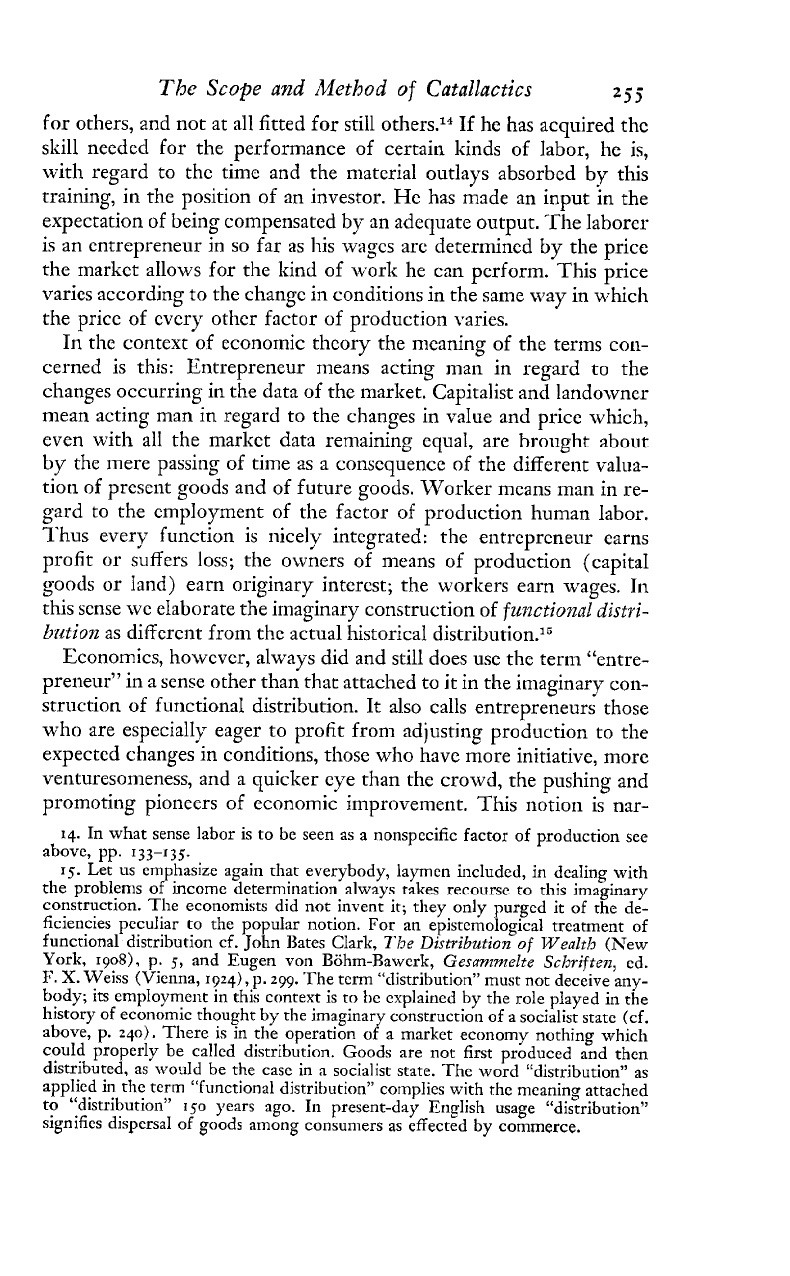
The
Scope
and
Method
of
Catallactics
for others, and not at all fitted for still others.14 If he has acquired the
skill needed for the performance of certain kinds of labor, he
is,
with regard to the timc and the material outlays absorbed
by
this
training, in the position of an investor. He has made an input in the
expectation of being compensated by an adequate output. The laborer
is an entrepreneur in so far as his
wages
are determined
by
the price
the rnarket allows for the kind of work he can perform. This price
varies according to the change in conditions in the same way in which
the price of every other factor of production varies.
In
the context of economic theory the meaning of the terms con-
cerned is this: Entrepreneur means acting man in regard to the
changes occurring in the data of the market. Capitalist and landowner
mean acting man in regard to the changes in vaIue and price which,
even with all the market data remaining equal, are brought about
by the mere passing of time as a consequence of the different valua-
tion
of
present goods and of future goods. Worker means man in re-
gard to the employment of the factor of production human labor.
Thus every function is nicely integrated: the
entrepreneur
earns
profit or suffers loss; the owners of means of production (capita1
goods or land) earn originary interest; the workers earn wages. In
this sense we elaborate the imaginary construction of
functiond
dist~i-
bution
as different from the actual historical distribution.16
Economics, howcver, always did and still does use the term "entre-
preneur" in a sense other than that attached to it in the imaginary con-
struction of functional distribution. It also calls entrepreneurs those
who are especially eager to profit from adjusting production to the
expected changes in conditions, those who have more initiative, more
venturesomeness, and a quicker eye than the crowd, the pushing and
promoting pioneers of economic improvement. This notion is nar-
14.
In what sense labor is to be seen as a nonspecific factor of production see
above, pp. 133-135.
15.
Let us emphasize again that everybody, laymen included, in dealing with
the problems of income determination always takes recourse to
this
Imaginzry
construction. The economists did not invent it; they only purged it of the de-
ficiencies peculiar to the popular notion. For an epistemological treatment of
functional distribution cf. John Bates Clark,
The
Distribution
of
Wealth
(New
York, 1908). p.
5,
and Eugen von Bohm-Rawerk,
Geravzmelte
Schriften,
ed.
F.
X.
Weiss (Vienna,
1924)~
p.
299.
The tcrm "distribution" must not deceive any-
body;
its
empIoyment in this context is to be cxplairled
by
the
role played in the
history of economic thought by the imaginary construction of a socialist state (cf.
above,
p.
240).
There is in the operation of a market economy nothing which
could properly be called distribution. Goods are not first produced and then
distributed, as would be the case in
a
socialist state. The word "distribution" as
applied in the term "functional distribution" complies with the meaning attached
to "distribution" 150 years ago.
In
present-day English usage "distribution"
signifies dispersal of goods among consumers as effected by commerce.
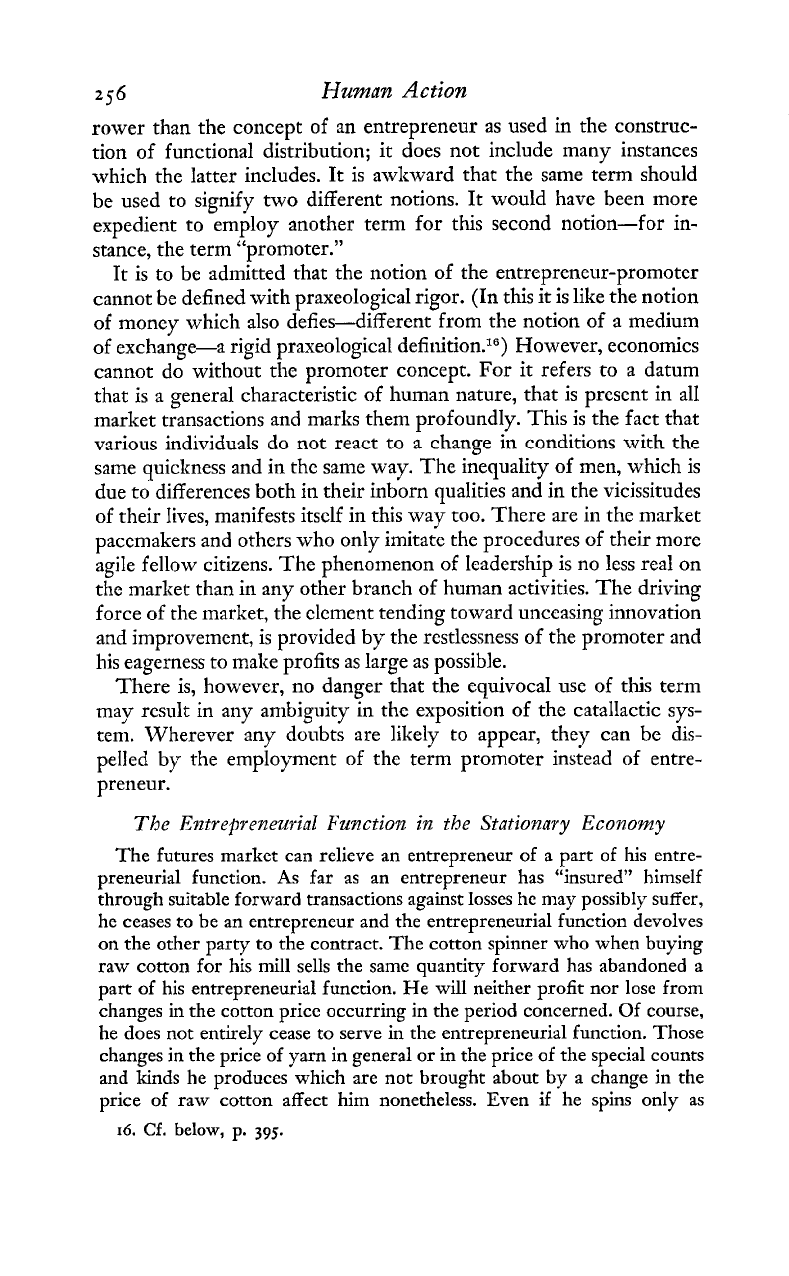
256
Human
Action
rower than the concept of an entrepreneur as used in the construc-
tion of functional distribution; it does not include many instances
which the latter includes. It is awkward that the same term should
be uscd to signify two different notions. It would have been more
expedient to employ another term for this second notion-for in-
stance, the term "promoter."
It is to be admitted that the notion of the entrepreneur-promoter
cannot be defined with praxeological rigor. (In this
it
is like the notion
of money which also defies-different from the notion of a medium
of exchange-a rigid praxeological defiuition.l6) However, economics
cannot do without the promoter concept. For it refers to a datum
that is a general characteristic of human nature, that is present in all
market transactions and marks them profoundly. This is the fact that
various individuals do not react to
a
change in conditions with the
same quickness and in the same way. The inequality of men, which is
due to differences both in their inborn qualities and in the vicissitudes
of their lives, manifests itself in this way too. There are in the market
pacemakers and others who only imitate the procedures of their more
agile fellow citizens. The phenomenon of leadership is no less real on
the market than in any other branch of human activities. The driving
force of the market, the element tending toward unceasing innovation
and improvement, is provided by the restlessness of the promoter and
his eagerness to make profits as large as possible.
There is, however, no danger that the equivocal use of this term
may result in any ambiguity in the exposition of the catallactic sys-
tem. Wherever any doubts are likely to appear, they can be dis-
pelled by the employment of the term promoter insiead of entre-
preneur.
The Entrepreneurial Function in the Stationary Economy
The futures market can relieve an entrepreneur of a part
of
his entre-
preneurial function. As far as an entrepreneur has "insured" himself
through suitabie forward transactions against iosses he may possibiy suffer,
he ceases to be an entrepreneur and the entrepreneurial function devolves
on the other party to the contract. The cotton spinner who when buying
raw cotton for his mill sells the same quantity forward has abandoned a
part of his entrepreneurial function. He will neither profit nor lose from
changes in the cotton price occurring in the period concerned. Of course,
he does not entirely cease to serve in the entrepreneurial function. Those
changes in the price of yarn in general or in the price of the special counts
and kinds he produces which are not brought about by a change in the
price of raw cotton affect him nonetheless. Even
if
he spins only as
16.
Cf.
below,
p.
395.
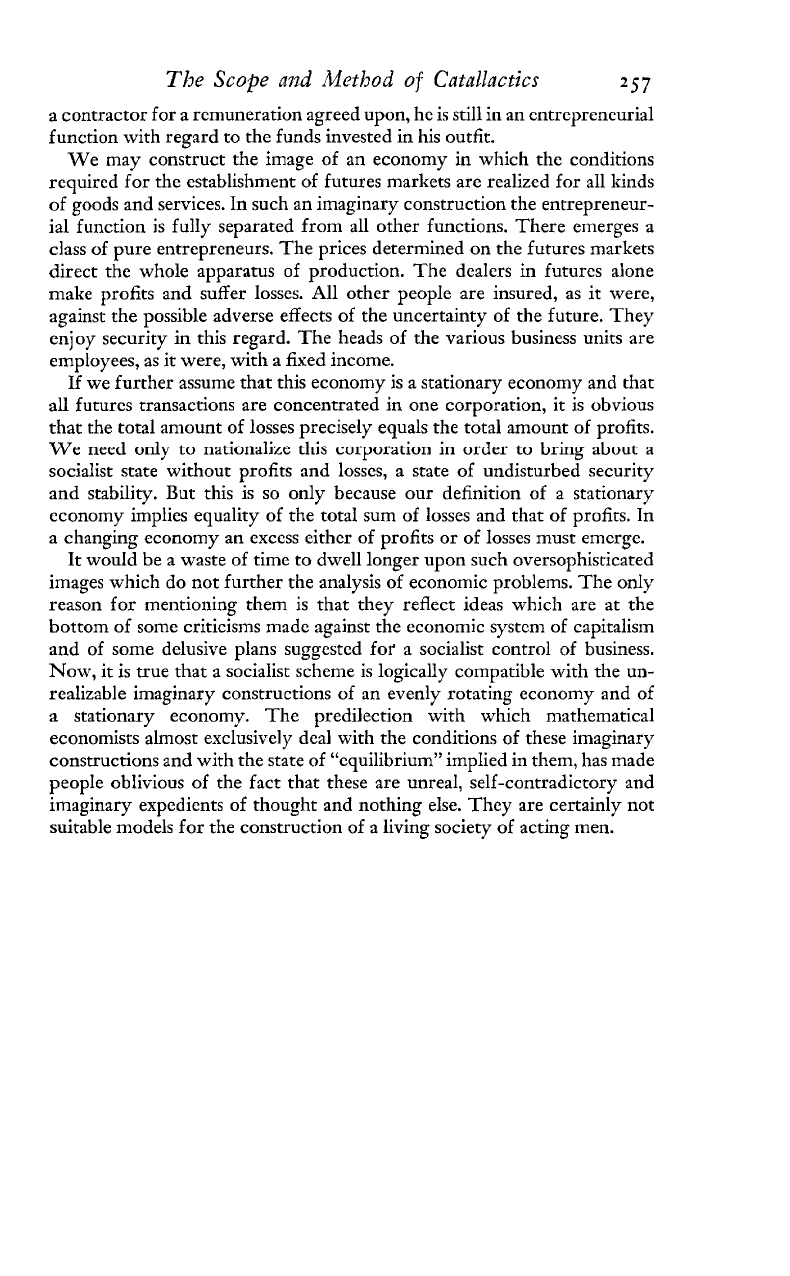
The
Scope and Method of Catallactics
257
a contractor for a remuneration agreed upon, he is still in an entrepreneurial
function with regard to the funds invested in his outfit.
We may construct the image of an economy
in
which the conditions
required for the establishment of futures markets are realized for all kinds
of goods and services. In such an imaginary construction the entrepreneur-
ial function is fulIy separated from all other functions. There emerges
a
class of pure entrepreneurs. The prices determined on the futures markets
direct the whole apparatus of production. The dealers in futures alone
make profits and suffer losses. All other people are insured, as it were,
against the possible adverse effects of the uncertainty of the future. They
enjoy security in this regard. The heads of the various business units are
employees, as it were, with
a
fixed income.
If we further assume that this economy is a stationary economy and that
all futures transactions are concentrated in one corporation, it is obvious
that the total amount of losses precisely equals the total amount of profits.
We need only to nationalize this corporation in order to bring about a
socialist state without profits and losses, a state of undisturbed security
and stability. But this is so only because our definition of a stationary
economy implies equality of the total sum of losses and that of profits. In
a changing economy an excess either of profits or of losses must emerge.
It would be a waste of time to dwell longer upon such oversophisticated
images which do not further the analysis of economic problems. The only
reason for mentioning them is that they reflect ideas which are at the
bottom of some criticisms made against the economic system of capitalism
and of some delusive plans suggested for a socialist control of business.
Now, it is true that a socialist scheme is logically compatible with the un-
realizable imaginary constructions of an evenly rotating economy and of
a stationary economy. The predilection with which mathematical
economists almost exclusively deal with the conditions of these imaginary
constructions and with the state of "equilibrium" implied in them, has made
people oblivious of the fact that these are unreal, self-contradictory and
imaginary expedients of thought and nothing else. They are certainly not
suitable models for the construction of a living society of acting men.
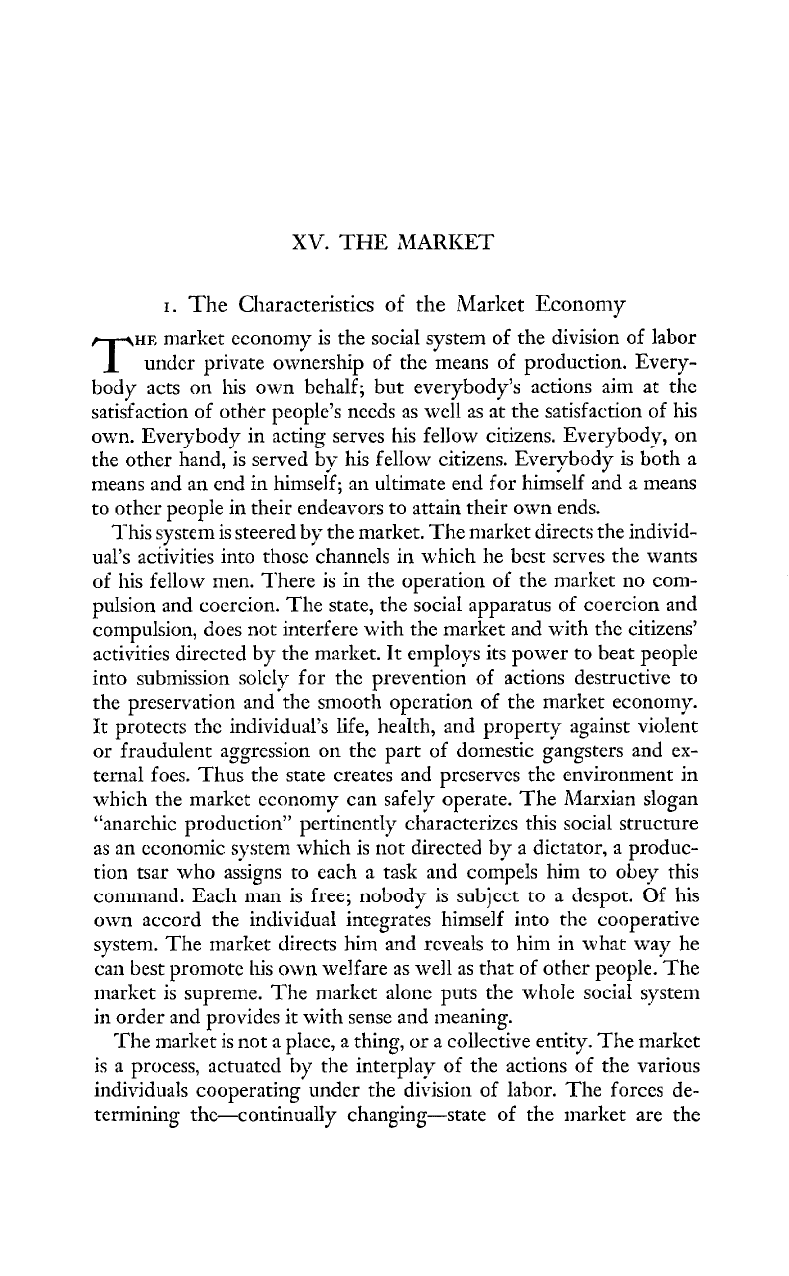
XV.
THE
MARKET
I.
The Cllaracteristics
of
the Market Econon~y
T
HE
market economy is the social system of the division of labor
under private ownership of the means of production. Every-
body acts on his own behalf; but everybody's actions aim at the
satisfaction of other people's needs as well as at the satisfaction of his
own. Everybody in acting serves his fellow citizens. Everybody, on
the other hand, is served by his fellow citizens. Everybody is both a
means and an end in himself; an ultimate end for himself and
a
means
to other people in their endeavors to attain their own ends.
This system is steered by the market. The market directs the individ-
ual's activities into thosc channels in which he best serves the wants
of his fellow men. There is in the operation of the marltet no com-
pulsion and coercion. The state, the social apparatus of coercion and
con~pulsion, does not interfere with the market and with the citizens'
activities directed by the market. It employs its power to beat people
into submission solely for the prevention of actions destructive to
the preservation arid the smooth operation of the market economy.
It protects the individual's Life, health, and property against violent
or fraudulent aggression on the part of domestic gangsters and ex-
ternal foes. Thus the state creates and preserves the environment in
which the market economy can safely operate. The A4arxian slogan
"anarchic production'' pertinently characterizes this social structure
as an economic system which is not directed by a dictator, a produc-
tion tsar who assigns to each a task and compels hini to obey this
coiiiiii,aiid.
Eacli
maii
is fi.ee; iiobody is
s"bjeci
to
a
&spot
0:
his
own accord the individual integrates himself into the cooperative
system. The market directs him and reveals to him in what way he
can best promote his own welfare as well as that of other people.-~he
market is supreme. The market alone puts the whole social system
in order and provides it with sense and meaning.
The market is not
a
place, a thing, or a collective entity. The market
is a process, actuated
by
the interplay of the actions of the various
individuals cooperating undcr the di&ion of labor. The forces de-
termining the-continually changing-state of the market are the
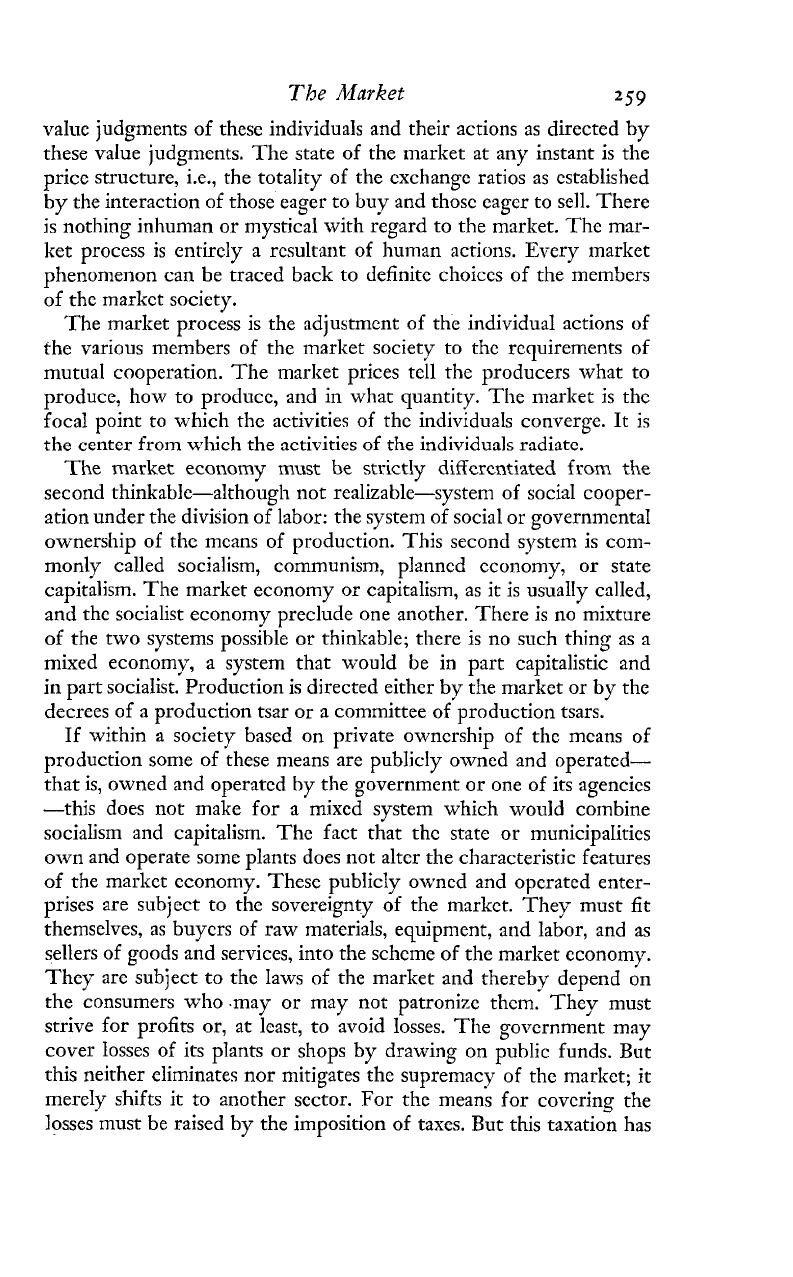
The
Market
2.59
value judgments of these individuals and their actions as directed by
these value judgments. The state of the market at any instant is the
price structure, i.e., the totality of the exchange ratios as established
by the interaction of those eager to buy and those eager to sell. There
is nothing inhuman or mystical with regard to the market. The mar-
ket process is entirely a resultant of human actions. Every market
phenomenon can be traced back to definite choices of the members
of the market society.
The market process is the adjustment of the individual actions of
the various members of the tnarket society to the requirements of
mutual cooperation. The market prices tell the producers what to
produce, how to produce, and in what quantity. The market is the
focal point to which the activities of the individuals converge. It ic
the center from which the activities of the individuals radiate.
The market economy must be strictly differentiated
from
the
second thinkable-although not realizable-system of social cooper-
ation under the division of labor: the system of social or governmentaI
ownership of thc means of production. This second system is com-
monly called socialism, communism, planned economy, or state
capitalism. The market economy or capitalism, as it is usually called,
and the socialist economy preclude one another. There is no mixture
of the two systems possil~le or thinkable; there is no such thing as a
mixed economy, a system that would be in part capitalistic and
in part socialist. Production is directed either by the market or by the
decrees of a production tsar or a committee of production tsars.
If within a society based on private ownership of the means of
production some of these means are publicly owned and operated-
that is, owned and operated by the government or one of its agencies
-this does not make for a mixed system which would combine
socialism and capitalism. The fact that the state or municipalities
own and operate some plants does not alter the characteristic features
of the market economy. These publicIy owned and operated enter-
prises are subject to the sovereignty of the market. They must
fit
themselves, as buyers of raw materials, equipment, and labor, and as
sellers of goods and services, into the scheme of the market economy.
They are subject to the laws of the market and thereby depend on
the consumers who .may or may not patronize them. They must
strive for profits or, at least, to avoid losses. The government may
cover losses of its plants or shops by drawing on public funds. But
this neither eliminates nor mitigates the supremacy of the market; it
merely shifts it to another sector. For the means for covering the
losses~rnust be raised by the imposition of taxes. But this taxation has
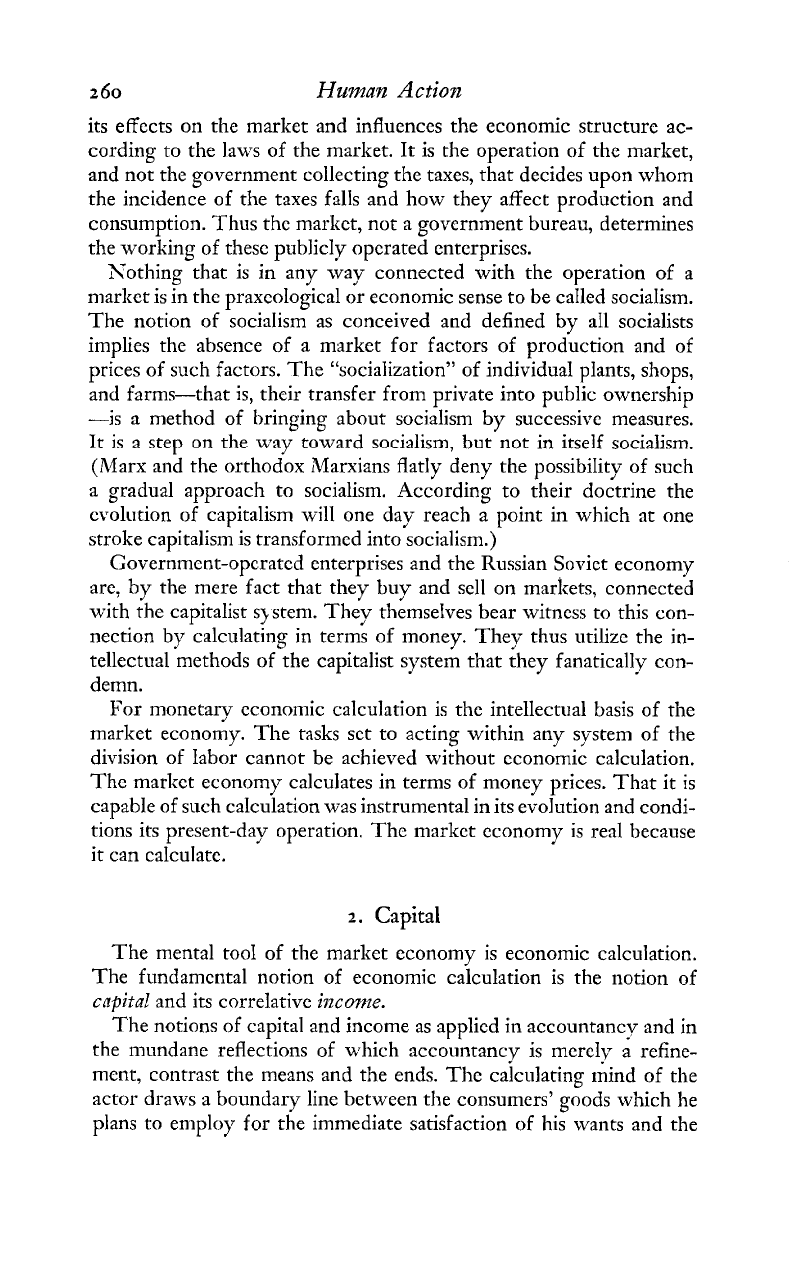
a
60
Human
Action
its effects on the market and influences the economic structure ac-
cording to the laws of the market. It is the operation of the market,
and not the government collecting the taxes, that decides upon whom
the incidence
of
the taxes falls and how they affect production and
consumption. Thus the market, not a government bureau, determines
the working of these publicly operated enterprises.
Kothing that is in any way connected with the operation of a
n~arltct is in the praxeological or economic sense to be called socialism.
The notion of socialism as conceived and defined by a11 socialists
implies the absence of a market for factors of production and of
prices of such factors. The "socialization" of individ~zal plants, shops,
and farms-that is, their transfer from private into public ownership
-is a method of bringing about socialism by successive measures.
It
is
a
step on the way toward socialism, but not in itself socialism.
(Marx and the orthodox Marxians flatly deny the possibility of such
a gradual approach to socialism. According to their doctrine the
evolution of capitalism will one day reach a point in which at one
stroke capitalism is transformed into socialism.)
Government-operated enterprises and the Russian Soviet economy
are, by the mere fact that they buy and sell on markets, connected
with the capitalist sj stem. They themselves bear witness to this con-
nection by calculating in terms of money. They thus utilize the in-
tellectual methods of the capitalist system that they fanatically con-
demn.
For monetary economic calculation is the intellectual basis of the
market economy. The tasks set to acting within any system of the
division of labor cannot be achieved without economic calculation.
The market economy calculates in terms of money prices. That it is
capable of such calculation w-as instrumental in its evolution and condi-
tions its present-day operation. The market economy is real because
it
can calculatc.
2.
Capital
The mental tool of the market economy is economic calculation.
The fundamental notion of economic calculation is the notion of
cnpital
and its correlative
income.
The notions of capital and income as applied in accountancv and in
the mundane reflections of which accountancy is merely
a
refine-
ment, contrast the means and the ends. The calculating 14ind of the
actor draws a boundary line between the consumers' goods which he
plans to employ for the immediate satisfaction of his wants and the
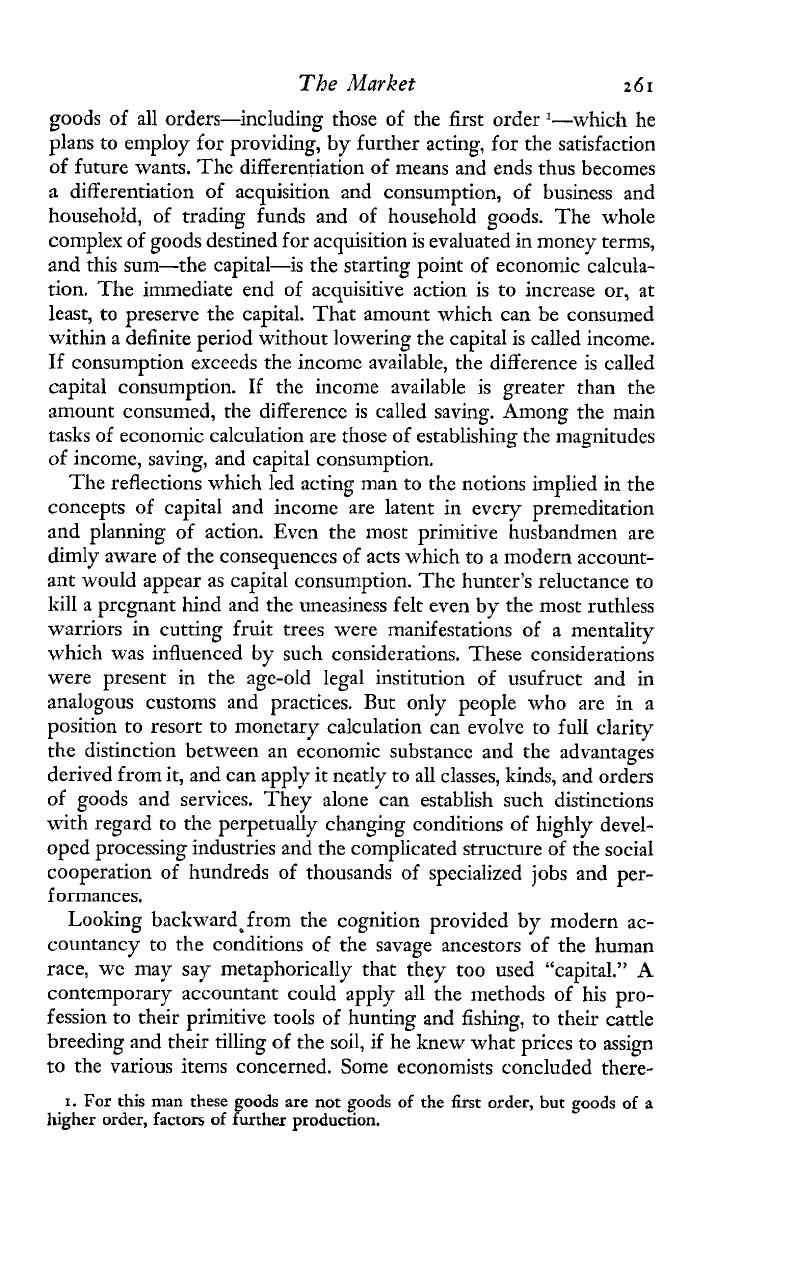
The
Market
261
goods of all orders-including those of the first order '-which he
plans to employ for providing,
by
further acting, for the satisfaction
of future wants. The differentiation of means and ends thus becomes
a differentiation of acquisition and consumption, of business and
househoId, of trading funds and of household goods. The whole
complex of goods destined for acquisition is evaluated in money terms,
and this sum-the capital-is the starting point of economic calcula-
tion. The immediate end of acquisitive action is to increase or, at
least, to preserve the capital. That amount which can be consumed
within a definite period without lowering the capital is called income.
If consumption exceeds the incomc available, the difference is called
capital consumption. If the income available is greater than the
amount consumed, the difference is called saving. Among the main
tasks of economic calculation are those of establishing the magnitudes
of income, saving, and capital consumption.
The reflections which led acting man to the notions implied in the
concepts of capital and income are latent in every premeditation
and planning of action. Even the most primitive husbandmen are
dimly aware of the consequences of acts which to a modern account-
ant would appear as capital consumption. The hunter's reluctance to
kill a pregnant hind and the uneasiness felt even by the most ruthless
warriors in cutting fruit trees were manifestations of a mentality
which was influenced by such considerations. These considerations
were prcsent in the age-old legal institution of usufruct and in
analogous customs and practices. Rut only people who are in a
position to resort to monetary calculation can evolve to full clarity
the distinction between an economic substance and the advantages
derived from it, and can apply it neatly to all classes, kinds, and orders
of goods and services. They alone can establish such distinctions
with regard to the perpetually changing conditions of highly devel-
oped processing industries and the complicated structure of the social
cooperation of hundreds of thousands of specialized jobs and per-
f
ormances.
Looking backward*from the cognition provided by modern ac-
countancy to the conditions of the savage ancestors of the human
race, wc may say metaphorically that they too used "capital."
A
contemporary accountant could apply all the methods of his pro-
fession to their primitive tools of hunting and fishing, to their cattle
breeding and their tilling of the soil, if he knew what prices to assign
to the various items concerned. Some economists concluded there-
I.
For this man these goods are not goods of the first order, but goods of
a
higher order, factors of further production.
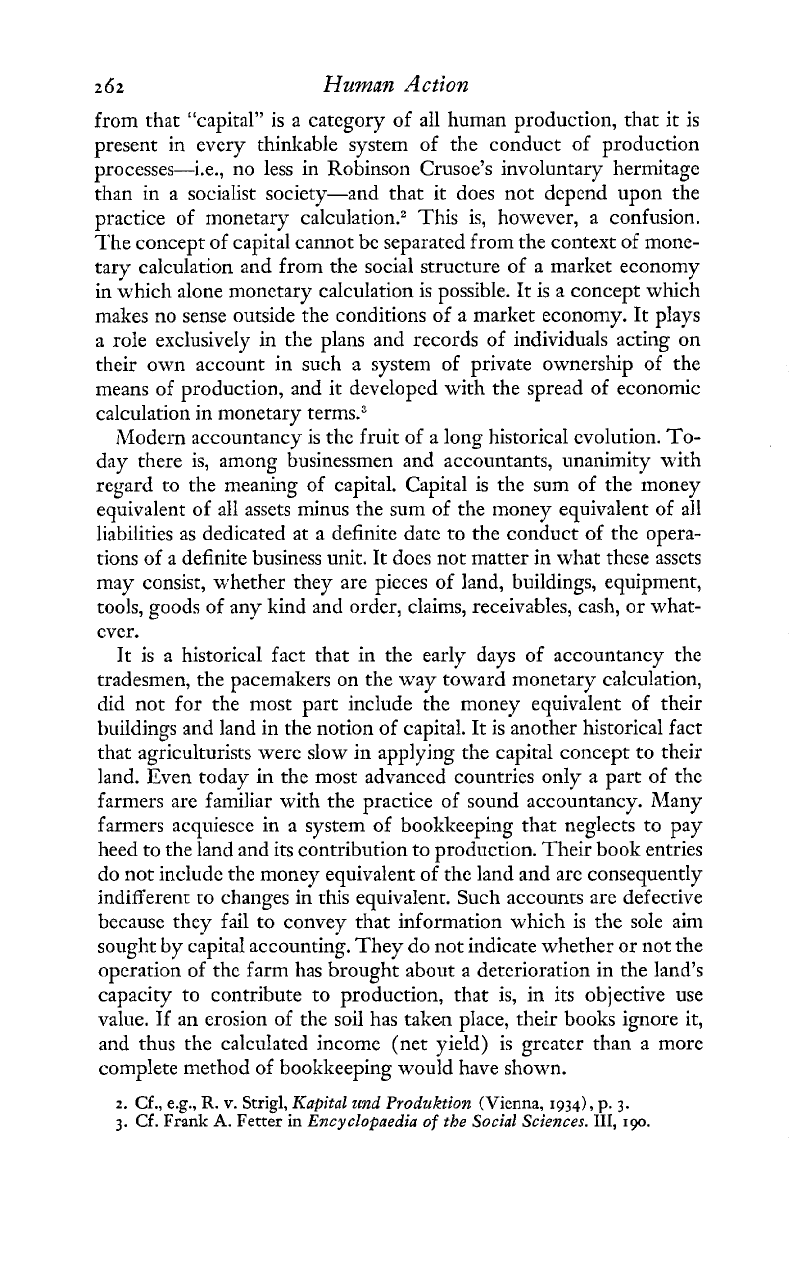
262
Human
Action
from that "capital" is a category of all human production, that it is
present in every thinkable system of the conduct of production
processes-i.e., no less in Robinson Crusoe's involuntary hermitage
than in a socialist society-and that it does not depend upon the
practice of monetary cal~ulation.~ This is, however, a confusion.
The concept of capital cannot be separated from the context of mone-
tary calculation and from the social structure of a market economy
in which alone monetary calculation is possible. It is
a
concept which
makes no sense outside the conditions of a market economy. It plays
a
role exclusively in the plans and records of individuals acting on
their own account in such a system of private ownership of the
means of production, and it developed with the spread of economic
calculation in monetary terrn~.~
Modern accountancy is the fruit of a long historicaI evolution. To-
day there is, among businessmen and accountants, unanimity with
regard to the meaning of capital. Capital is the sum of the money
equivalent of all assets minus the sum of the money equivalent of all
liabilities as dedicated at a definite date to the conduct of the opera-
tions of a definite business unit.
It
does not matter in what these assets
may consist, whether they are pieces of land, buildings, equipment,
tools, goods of any kind and order, claims, receivables, cash, or what-
ever.
It is a historical fact that in the early days of accountancy the
tradesmen, the pacemakers on the way toward monetary calculation,
did not for the most part include the money equivalent of their
lmildjngs and land in the notion of capital. It is another historical fact
that agriculturists were slow in applying the capital concept to their
land. Even today in the most advanced countries only
a
part of the
farmers are familiar with the practice of sound accountancy. Many
farmers acquiesce in a system of bookkeeping that neglects to pay
heed to the land and its contribution to production. Their book entries
do not include the money equivalent of the land and are consequently
indiiierenr to changes in this equivaient. Such accounts are defeerive
because they fail to convey that information which is the sole aim
sought by capital accountink. They do not indicate whether or not the
operation of the farm has brought about a detcrioration in the land's
capacity to contribute to production, that is, in its objective use
value. If an erosion of the soil has taken place, their books ignore it,
and thus the calcdated income (net yield) is grcater than a more
complete method of bookkeeping would have shown.
t.
Cf.,
e.g.,
R.
v.
Strigl,
Kapital zrnd Produktion
(Vienna,
19341,
p.
3.
3.
Cf.
Frank
A.
Fetter
in
Encyclopaedia of the Social Sciences.
111,
IF.
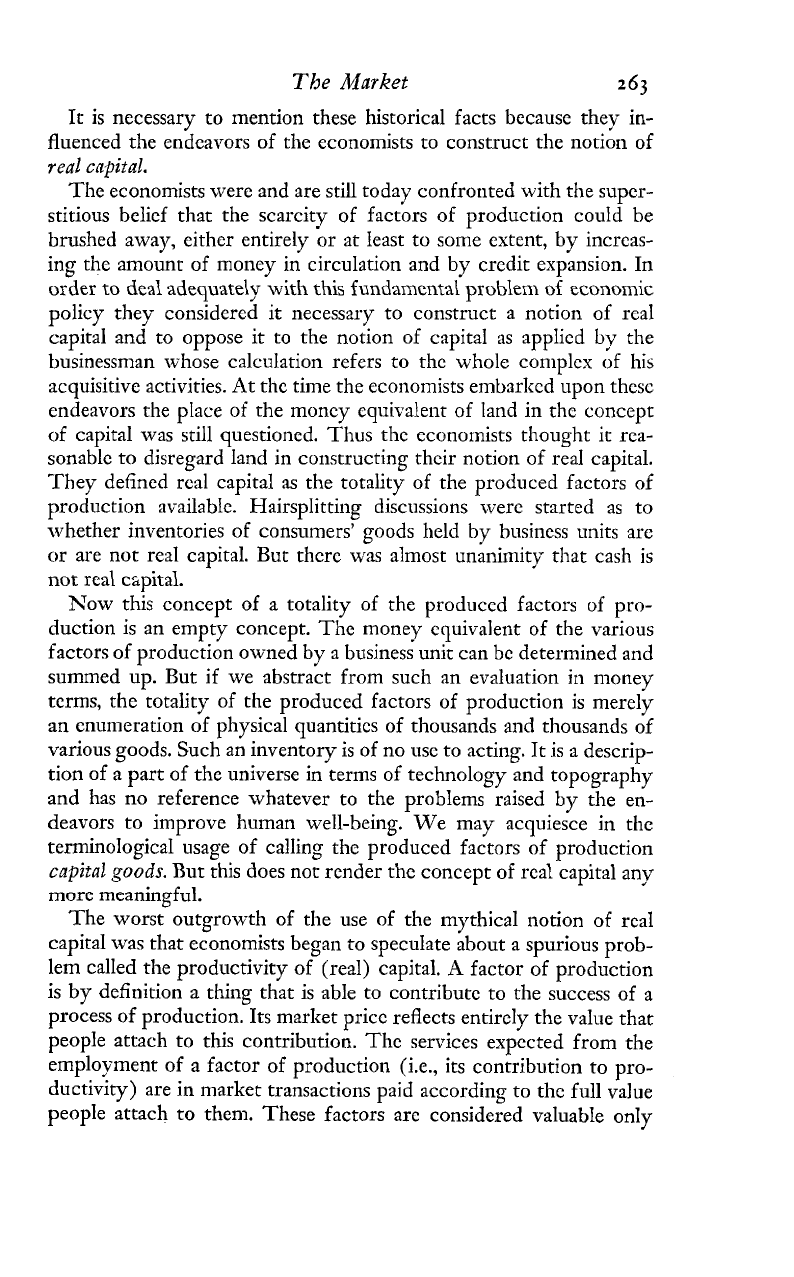
The
Market
263
It
is necessary to mention these historical facts because they in-
fluenced the cndcavors of the economists to construct the notion of
real
cnpital.
The economists were and are still today confronted with the super-
stitious belief that the scarcity of factors of production could be
brushed away, either entirely 'or at least to some extent, by increas-
ing the amount of money in circulation and by credit expansion. In
order to deal adequately with this
fundamental
problem
of economic
policy they considered it necessary to construct a notion of real
capital and to oppose it to the notion of capital as applied by the
businessman whose calculation refers to the whole complex of his
acquisitive activities. At the time the economists embarltcd upon thesc
endeavors the place of the money cqnivalem of land in the concept
of capital was still questioned. Thus the
economists
thought it rea-
sonable to disregard land in constructing their notion of real capital.
They defined real capital
as
the totality of the produced factors of
production availabIe. Hairsplitting discussions were started as to
whether inventories of consumers' goods held by business units are
or are not real capital. But thcrc was almost unanimity that cash is
not real czpital.
RTow this concept of a totality of the produced factors of pro-
duction is an empty concept. The money equivalent of the various
factors of production owned by a business unit can be determined and
summed up. But if we abstract from such an evaluation
in
money
terms, the totality of the produced factors of production is merely
an enumeration of physical quantities of thousands and thousands of
various goods. Such an inventory is of no use to acting. It is a descrip-
tion of a part of the universe in terms of technology and topography
and has
no
reference whatever to the problems raised by the en-
deavors to improve human well-being. We may acquiesce in the
terminologica1 usage of calling the produced factors of production
capital
goods.
But this does not render the concept of real capital any
more meaningful.
The worst outgrowth of the use of the mythical notion of real
capital was that economists began to speculate about a spurious prob-
lem called the productivity of (real) capital. A factor of production
is by definition a thing that is able to contribute to the success of a
process of production. Its market price reflects entirely the value that
people attach to this contribution. The services expected from the
employment of a factor of production (i.e., its contribution to pro-
ductivity) are in market transactions paid according to the full value
people attach to them. These factors are considered valuabIe only
